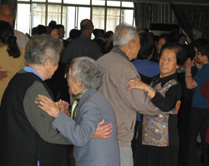
In response to recent assumptions among Chinese people that the Chinese government might loosen its family planning policy to cope with the population ageing problem, experts from leading Chinese research institutes have said this is definitely the last option China will choose.
Statistics from the Ministry of Civil Affairs showed that China had been reporting a high growth of aged population and had already moved into an ageing society, with about 134 million people aged 60 and above, or 10 percent of the total population.
According to the Institute of Population Research under Peking University, the number of senior citizens in China is projected to account for over a quarter of its total population by 2050.
"China should focus on economic development, improve public health and work out a package of programs to meet the challenge," said Wu Cangping, 81, a leading professor of ageing research with the People's University of China.
"An immediate outcome of a loosened family planning policy would be more newborns, who will not be able to join the country's work force until two decades later. Meanwhile, their parents, or the current working adults, will bear the burden of this baby boom, and lose the opportunity to seek self-improvement, like further education or professional training," Wu noted.
Zheng Xiaoying, director of the Institute of Population Research, echoed Wu's opinion.
"What really counts is the quality of the working population," she stressed. A well-educated child with a decent salary could do a better job in taking care of his or her parents than three impoverished children who even have to turn to their parents for help from time to time, she added.
Both experts agreed that China had entered an ageing society, but pointed out that the situation was not yet out of control.
Wu said the Chinese population roughly equals the combined population of all developed countries in the world, but the ageing problem in China is not as serious.
"So we still have some time to tackle this problem," he said.
Zheng held that diversified methods should be employed to address the population ageing issue in different parts of China due to the unbalanced ageing process nationwide.
Shanghai, a metropolis in the better developed eastern coastal areas, entered the ageing society in 1979 whereas some less developed provinces, such as Qinghai in west China, are not likely to face the problem until 2010.
Wu urged society not to "marginalize the aged group". He said the society should not exclude the aged from its mainstream activities and should guarantee their full dignity.
Zheng said that efforts should be made to guarantee the quality of life for every senior citizen in the country, as well as to recognize them as full and useful members of society.
The experts also urged the government to play a vital role in addressing ageing issues, such as adopting preferential housing policies for the aged people, providing better health care for them, and expanding the social insurance schemes to cover all retirees, among others.
(Xinhua News Agency November 5, 2003)
|

